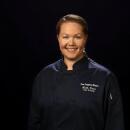Festival of Books: Tweaking the food chain
- Share via
This article was originally on a blog post platform and may be missing photos, graphics or links. See About archive blog posts.
How much do you think about food, specifically where it comes from and how it gets to you? What choices do you consider in how you eat and why?
The modern-day love affair with all things related to food and cooking has spurred a new genre of food writing that looks at the back story of the food you eat every day. Los Angeles Times Food Editor Russ Parsons sat down Saturday with authors Kathleen Flinn, Julie Guthman and Tracie McMillan to explore this back story in an L.A. Times Festival of Books panel called The Food Chain.
Flinn, a former journalist and author of the new book “The Kitchen Counter Cooking School,” talked about how food has become something of a spectator sport to many people. Americans may watch a lot of food programs on television and recognize celebrity chefs and the food they make. But when it comes to actually producing a basic meal in the kitchen, many don’t know how to hold a knife, let alone how to prepare food and plan a menu. She says that, in essence, “we’ve lost those skills.”
Guthman, an associate professor at the University of California Santa Cruz, wrote “Agrarian Dreams: The Paradox of Organic Farming in California.” Her most recent title, “Weighing In: Obesity, Food Justice, and the Limits of Capitalism,” challenges what we many people think they know about food and obesity.
Although they may associate weight gain and obesity with eating more and exercising less, she argued that there is no direct evidence that this is true, and explores other factors such as environmental toxins.
McMillan, who wrote “The American Way of Eating: Undercover at Walmart, Applebee’s, Farm Fields and the Dinner Table,” said that although Americans may eat poorly, it’s “more than a preference for junk food.” Rather, she said, poor eating habits often relate to a lack of time and money, meaning people might eat better if only they had the means to do so. FULL COVERAGE: Festival of Books
So what’s the secret ingredient to making this paradigm change in eating habits? Knowledge.
Flinn and McMillan argued for teaching people basic cooking skills. If people could cook, they might not be so reliant on packaged and industrial foods. Cooking is a fundamental skill that, according to Flinn, “we don’t teach or value” as we should.
Flinn also shared an interesting observation she made at tastings involving various forms of the same food. At one tasting for Parmesan cheese, she asked people to taste variations of the ingredient -- say, a wedge of fresh Parmesan against packaged grated and shredded variations.
In side-by-side tastings, people tended to choose the wedge of Parmesan cheese, even though it was more expensive, because it tasted better. The bottom line: People used less of the more flavorful yet costlier cheese, thereby saving money or spending less than one might think.
The panel also talked about organic foods and the importance of educating people about what they eat. Although organic foods may be more expensive, Flinn noted that people can, and will, spend more if they know they are getting better food.
Finally, the authors stressed the need for more awareness of food issues. When something [like the high-fructose corn syrup issue] hits the mainstream, that’s when change happens, argued Flinn. People need to be informed so they can be vocal, in order to institute change.
ALSO:
Rodney King and the L.A. riots
Film writers debate Oscar’s love of ‘The Artist’
-- Noelle Carter
